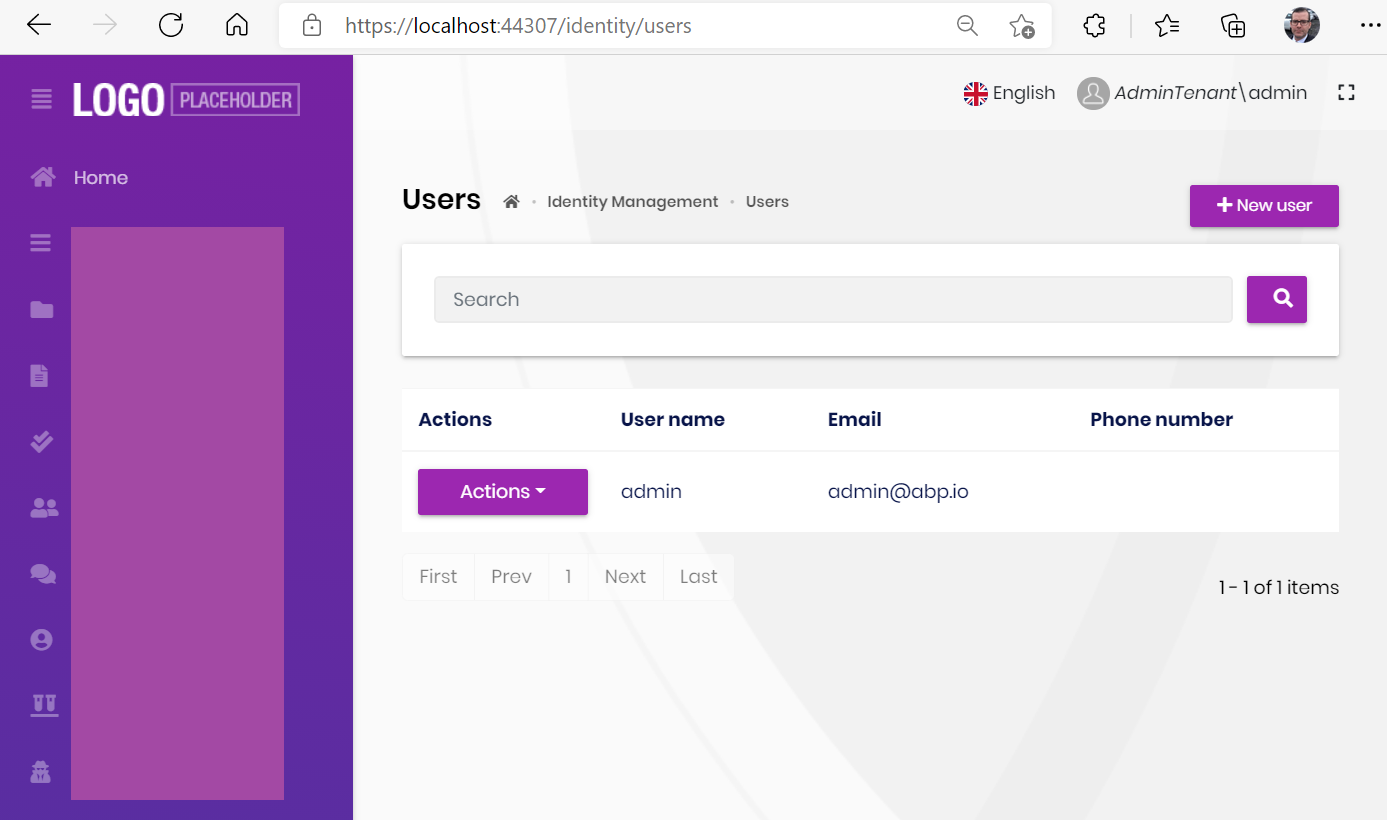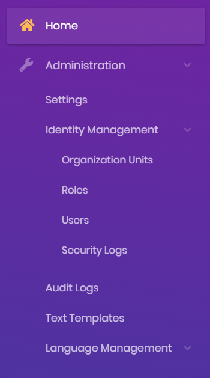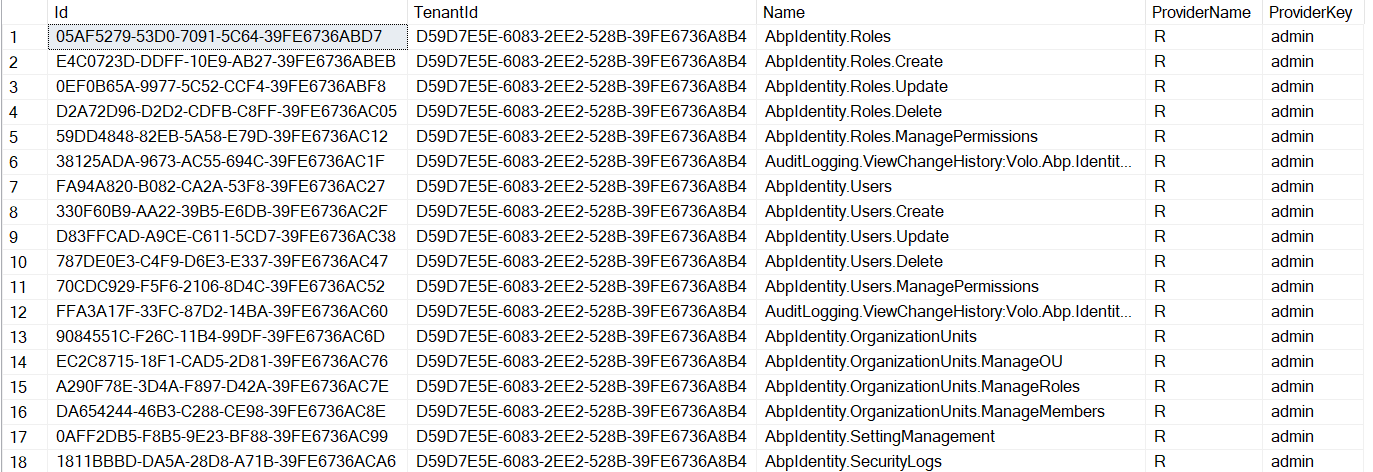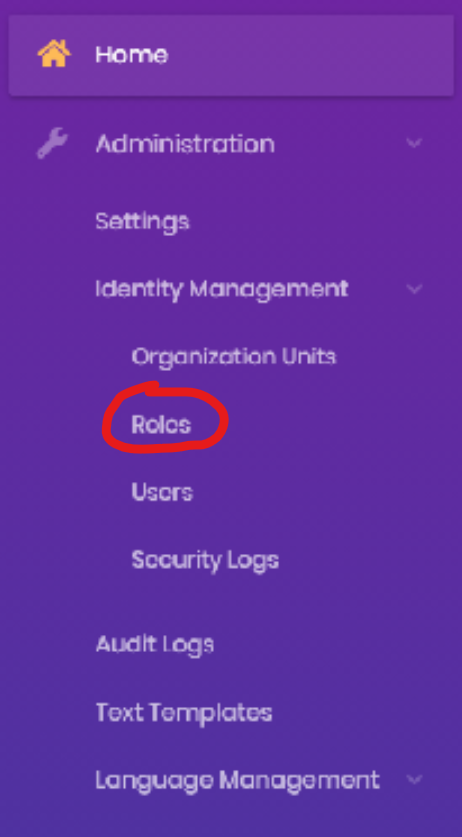I just noticed that the administration side menu has completely vanished! If I create a new tenant and log-in never shows up.
BUT I still can navigate to say /idenity/users and access the pages so its not any access control issue.
Here you can see that there is no Administration dropdown in the sidemenu (I know I should have cropped less from the names but trust me, its not there).

I have gone over everything multiple times and I can´t see anywhere that I´m to blame!
No problem sending someone my solution to check this out.
- ABP Framework version: 4.4.0
- UI type: Blazor
- DB provider: EF Core
- Identity Server Separated: yes
16 Answer(s)
-
0
hi
Can you try to using the brand new 4.4 template project?
Or refresh the page maybe help.
-
0
Ok I managed to find the issue and it was this https://github.com/abpframework/abp/issues/9579 where I hid the admin menu (just before going on a summer vacation and forgot about it)
BUT that does not negate my issue, of hiding parts of the menu

What do I use to remove these grants/permissions from the tenant?
I have tried IPermissionManager but that doesn´t do it
Here is my code where I´m trying to remove these menu items by trying to remove them from the AbpPermissionGrants table.
public class RegisteredUserHandler : IDistributedEventHandler<EntityCreatedEto<UserEto>>, ITransientDependency { public RegisteredUserHandler(IdentityUserManager identityUserManager, IPermissionManager permissionManager) { this.identityUserManager = identityUserManager; this.permissionManager = permissionManager; } private readonly IdentityUserManager identityUserManager; public IPermissionManager permissionManager { get; } [UnitOfWork] public async virtual Task HandleEventAsync(EntityCreatedEto<UserEto> eventData) { var theJustNowCreatedIdentityUser = await identityUserManager.GetByIdAsync(eventData.Entity.Id); // Only add this OrdinaryClientRole to none tenant users! if (!eventData.IsMultiTenant(out _)) { var result = await identityUserManager.AddToRoleAsync(theJustNowCreatedIdentityUser, RoleConstants.OrdinaryClientRole); } else { //This does not remove anything await permissionManager.SetForUserAsync(eventData.Entity.Id, "AbpIdentity.Roles.ManagePermissions", false); } } }Hopefully you can point me in the right direction...
-
0
What do I use to remove these grants/permissions from the tenant?
You can refer to RoleDeletedEventHandler
https://github.com/abpframework/abp/blob/48c52625f4c4df007f04d5ac6368b07411aa7521/modules/identity/src/Volo.Abp.PermissionManagement.Domain.Identity/Volo/Abp/PermissionManagement/Identity/RoleDeletedEventHandler.cs#L24
-
0
Thaks I have been trying to get this to work but hitting this code does not remove the permission.
[UnitOfWork] public async virtual Task HandleEventAsync(EntityCreatedEto<UserEto> eventData) { //doesn´t remove the permission await permissionManager.DeleteAsync("AbpIdentity.Roles.ManagePermissions",eventData.Entity.Name); }What am I missing?
I then thought it might be related to it being a
IdentityUserCreatedEtobut that code (below) is never hit.public class TenantCreatedHandler : IDistributedEventHandler<EntityCreatedEto<IdentityUserCreatedEto>>, ITransientDependency { public TenantCreatedHandler(IdentityUserManager identityUserManager, IPermissionManager permissionManager) { this.identityUserManager = identityUserManager; this.permissionManager = permissionManager; } private readonly IdentityUserManager identityUserManager; public IPermissionManager permissionManager { get; } [UnitOfWork] public async virtual Task HandleEventAsync(EntityCreatedEto<IdentityUserCreatedEto> eventData) { //this is never hit... var entity = await identityUserManager.GetByIdAsync(eventData.Entity.Id); await permissionManager.DeleteAsync("AbpIdentity.Roles.ManagePermissions", entity.Name); } } -
0
-
0
Ok but will that not remove ALL the permissions from the tenant?
I just want to remove specific things like e.g. access to the Roles under Identity but I would like to keep access to Users. Like I don't want my tenants to be messing with Language Management or Text Templates.
Am I totally missing how this works? So sorry if I´m...
-
0
Ok I think I got it.
Should I do the following (and correct me if I´m wrong)
- On Tenant created: Delete all the given role permissions the user has, using
permissionManager.DeleteAsync("R", entity.Name); - Create a new role containing the permissions I want a tenant to have. (do this at db seeding)
- Add this user to the new role
Is that what we are talking about?
Something like this here?
[UnitOfWork] public async virtual Task HandleEventAsync(EntityCreatedEto<UserEto> eventData) { var isTenant = eventData.Entity.TenantId.HasValue; if (isTenant) { //Delete all the permissions await permissionManager.DeleteAsync("R", eventData.Entity.Name); // Give it the correct permissions var permissions = new List<string> { "AbpIdentity.Roles", "AbpIdentity.Roles.ManagePermissions", "AbpIdentity.Users", "AbpIdentity.OrganizationUnits", "AbpAccount.SettingManagement", "IdentityServer.ApiResource" }; foreach (var perm in permissions) { await permissionManager.SetForRoleAsync(RoleConstants.TenantClientRole, perm, true); //No sure about this one... await permissionManager.SetForUserAsync(eventData.Entity.Id, perm, true); } } }I can´t see any menu yeat but thats hopefully because I havent added all the permissions. I try that out to morrow if you say that I´m on the right track

- On Tenant created: Delete all the given role permissions the user has, using
-
0
hi
using (CurrentTenant.Change(TargetTenantId)) { //delete permissionName. permissionManager.SetAsync(string permissionName, string providerName, string providerKey, bool isGranted false) //delete all permissions. permissionManager.DeleteAsync(string providerName, string providerKey); } -
0
Ok that was the last missing puzzle for me! Thank you!!
But I´m still not sure if I should use roles with permissions and add them to tenant or add/delete individual permissions.
I really think the roles/permissions documentation should be augmented by more scenarios and Q/A-ish code parts.
-
0
One small help before I close this issue, because I really want to use role with permissions.
So why can't the role not be found when using the IDistributedEventHandler but is when seeding data?
[UnitOfWork] public async virtual Task HandleEventAsync(EntityCreatedEto<UserEto> eventData) { using (currentTenant.Change(eventData.Entity.TenantId)) { //This never returns the roles created when I seed. I have tried to skip the using etc. var role = await identityRoleRepository .FindByNormalizedNameAsync(lookupNormalizer.NormalizeName(RoleConstants.TenantClientRole)); if (role is null) { var newRole = new IdentityRole(guidGenerator.Create(), RoleConstants.TenantClientRole) { IsPublic = true, IsStatic = true }; await identityRoleRepository.InsertAsync(newRole, true); } //this will just return null var roleNotFound = await identityRoleRepository .FindByNormalizedNameAsync(lookupNormalizer.NormalizeName(RoleConstants.TenantClientRole)); //and then I can't AddToRoleAsync because the role is not found! var userJustCreated = await identityUserManager.GetByIdAsync(eventData.Entity.Id); //this throws "Role TENANTCLIENTROLE not found" await identityUserManager.AddToRoleAsync(userJustCreated, RoleConstants.TenantClientRole); } }And if I change to "null" tenant with
using (currentTenant.Change(null))I get the roles butvar userJustCreated = await identityUserManager.GetByIdAsync(eventData.Entity.Id);throws "There is no such an entity".
For completeness sake I´m able to run and seed the role with the DbMigrator with basically the same code
public async Task SeedAsync(DataSeedContext context) { var role = await identityRoleRepository .FindByNormalizedNameAsync(lookupNormalizer.NormalizeName(RoleConstants.TenantClientRole)); if (role is not null) { return; } // Create the role and insert it var newRole = new IdentityRole(guidGenerator.Create(), RoleConstants.TenantClientRole) { IsPublic = true, IsStatic = true }; await identityRoleRepository.InsertAsync(newRole,true); //returns the role var roleFound = await identityRoleRepository .FindByNormalizedNameAsync(lookupNormalizer.NormalizeName(RoleConstants.TenantClientRole)); }Hopefully I can just close this off after this question. Thanks so much for your asstance!
-
0
Maybe the SeedAsync method exec in Host side. Can you check the database?
-
0
Yes that is what I gathered
If I change the tenant to nul l I get the roles
[UnitOfWork] public async virtual Task HandleEventAsync(EntityCreatedEto<UserEto> eventData) { using (currentTenant.Change(null)) { var roleNotFound = await identityRoleRepository .FindByNormalizedNameAsync(lookupNormalizer .NormalizeName(RoleConstants.TenantClientRole)); } }BUT then I can´t add the role becuse the created user is not found
// this then throws var userJustCreated = await identityUserManager.GetByIdAsync(eventData.Entity.Id/TenantId); // this 'There is no such an entity. Entity type: Volo.Abp.Identity.IdentityUser, id: 7f7acfe7-4abe-2a43-f31f-39fe74a2a237'What secret sauce/steps do I need?
-
0
hi Sturla
Can you share a project and steps to show your question? : ) https://abp.io/get-started
-
0
Here it is but the "create a tenant UI" is missing (not sure how the open source version works) so I couldn´t try that out.
I added some information to the Readme file but I hope this is all self explanatory what I´m trying to do.
-
0
- Use
virtualinSeedAsyncmethod.
[UnitOfWork] public virtual async Task SeedAsync(DataSeedContext context)- Pass the
eventData.Entity.TenantIdto create new role
var newRole = new IdentityRole(guidGenerator.Create(), RolesDemoConstants.SelfServiceTenantClientRole, eventData.Entity.TenantId) { IsPublic = true, IsStatic = true }; - Use
-
0
Bingo! That seems to have solved the problem! Thanks for your patiance with me ;-)


